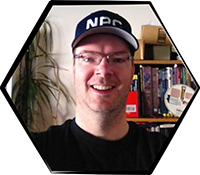As I think, it is not appropriate to clarify this in Adam's thread, I moved the posts to a new thread.
So let's summarize, as I understand it:
Tone is the feeling or the atmosphere that the author/GM has set in his story. It depends on what the author/GM himself feels toward the setting or the character, and what he wants us/the player to feel. "he is grinning" or "his left eyebrow twitches shortly"
Mood is the feeling or the atmosphere that the reader/player gets when he is reading/hearing the story. It depends on what the reader/player feels.
Both, Tone and Mood are evoked by connotations of words used by the author/GM in the assumption that the Tone he thereby creates induces a Mood in his readers/players. "feel excited" or "feel hopeful"
Razor is a word (or couple of words) normally taken from movies or books with hopefully strong connotations for a specific genre (or a mixture of genres) and is used to simplify the process of conveying this information by giving an appealing example. E.g. "Lord of the Rings" meets "Matrix" (But beware, most listeners have different connotations, so combinations like Lord of the Rings and Matrix might lead to very different expectations; as Razor is a tool for the GM and doesn't necessarily need to be discussed with the players, this is no problem, but in case you want to convey your idea for the game in order to create the correct expectations in your players, make sure you name what exactly you are dominantly trying to take from your razor words into your game).
Genre is a categorization for a set of tropes often found together. Examples are horror, investigation, scifi, fantasy, etc. and as you can see, they can be combined to new genres like horror fantasy or even dyed in a specific color like for a Cthulhu-esc horror low magic fantasy genre. In case of Genre changes, better also change the PC location, like from fantasy to horror by travelling to Transylvannia. Beware not to change genre without consulting players first (or know of their preferences). A great genre etc. questionnaire for players is the one from
Surveymonkey (just save before clicking "DONE")
Theme is a categorization for a campaign or adventure, that colors adventures and encounters in order to create Resonance. Theme can be changed during a session. In Resonance II above you say "Theme is about choosing, designing, and introducing gameplay elements that focus on your campaign goal." but I find it very vague and I have the impression that you do it differently (please correct me, if I'm wrong). I think you use Theme as a topic for the campaign or adventure, a topic that you want the players to experience for one reason or another (probably because you think that everyone enjoys this much or it is helpful for the players) in a specific way (is this your "campaign goal"?). Then you choose, design and introduce gameplay elements (like NPC traits, relationships, story elements, tone, etc. - see the example in Resonance II on how to do that) which help create or represent that theme.
Resonance is about choosing themes that will draw your players in and make them care deeply about what happens during the adventure (Your Resonance I and II RP Tips linked above are great, Johnn! Thank you very much for the great example there). Thus, Resonance is what happens within players when confronted with a Theme, just like Mood is what happens within players when confronted with a Tone. While the latter is micro-management of words, the former is macro-management of

